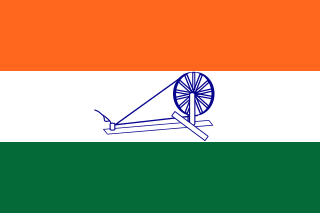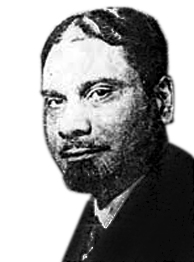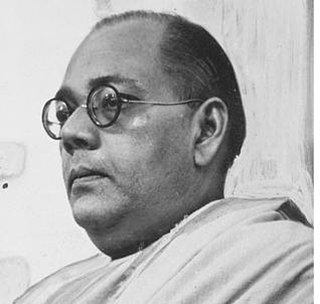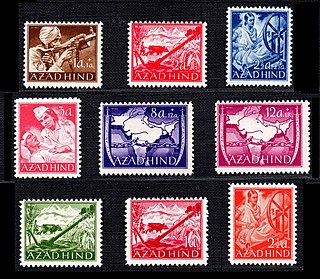
Subhas Chandra Bose was an Indian nationalist whose defiance of British authority in India made him a hero among many Indians, but his wartime alliances with Nazi Germany and Imperial Japan left a legacy vexed by authoritarianism, anti-Semitism, and military failure. The honorific 'Netaji' was first applied to Bose in Germany in early 1942—by the Indian soldiers of the Indische Legion and by the German and Indian officials in the Special Bureau for India in Berlin. It is now used throughout India.

Friedrich Adam von Trott zu Solz was a German lawyer and diplomat who was involved in the conservative resistance to Nazism. A declared opponent of the Nazi regime from the beginning, he actively participated in the Kreisau Circle of Helmuth James Graf von Moltke and Peter Yorck von Wartenburg. Together with Claus von Stauffenberg and Fritz-Dietlof von der Schulenburg, he conspired in the 20 July plot and was supposed to have been appointed Secretary of State in the Foreign Office and lead negotiator with the Western Allies if the plot had succeeded.

The Provisional Government of Free India or, more simply, Azad Hind, was a short-lived Japanese-supported provisional government in India. It was established in Japanese occupied Singapore during World War II in October 1943 and has been considered a puppet state of the Empire of Japan.
Azad Hind Radio was a radio service that was started under the leadership of Subhas Chandra Bose 1942 to encourage Indians to fight against the British. Though initially based in Nazi Germany, its headquarters were shifted to Japanese occupied Singapore following the course of the war in Southeast Asia. After Netaji's departure to Southeast Asia, the German operations were continued by A.C.N. Nambiar, the head of the Indian Legion in Nazi Germany and later ambassador of the Arzi Hukumate Azad Hind in Germany.

Netaji Subhas Chandra Bose: The Forgotten Hero is a 2004 Indian epic biographical war film, written and directed by Shyam Benegal. The film starred an ensemble cast of Sachin Khedekar, Kulbhushan Kharbanda, Rajit Kapur, Arif Zakaria, and Divya Dutta, among others. The film depicts the life of the Indian Independence leader Subhas Chandra Bose in Nazi Germany: 1941–1943, and In Japanese-occupied Asia 1943–1945, and the events leading to the formation of Azad Hind Fauj.

Emilie Schenkl was an Austrian stenographer, secretary and trunk exchange operator. She was the wife or the companion of Subhas Chandra Bose, an Indian nationalist leader.

Sugata Bose is an Indian historian and politician who has taught and worked in the United States since the mid-1980s. His fields of study are South Asian and Indian Ocean history. Bose taught at Tufts University until 2001, when he accepted the Gardiner Chair of Oceanic History and Affairs at Harvard University. Bose is also the director of the Netaji Research Bureau in Kolkata, India, a research center and archives devoted to the life and work of Bose's great uncle, the Indian nationalist, Subhas Chandra Bose. Bose is the author most recently of His Majesty's Opponent: Subhas Chandra Bose and India's Struggle against Empire (2011) and A Hundred Horizons: The Indian Ocean in the Age of Global Empire (2006).

Chempakaraman Pillai was an Indian-born political activist and revolutionary. Born in Thiruvananthapuram, to Tamil parents, he left for Europe as a youth, where he spent the rest of his active life as an Indian nationalist and revolutionary.

Sarat Chandra Bose was an Indian barrister and independence activist.

Indian nationalist leader Subhas Chandra Bose died on 18 August 1945 from third-degree burns sustained after the bomber in which he was being transported as a guest of Lieutenant General Tsunamasa Shidei of the Imperial Japanese Kwantung Army crashed upon take off from the airport in Taihoku, Japanese Formosa, now Taipei, Taiwan. The chief pilot, copilot, and General Shidei were instantly killed.

The Indian Legion, officially the Free India Legion or 950th (Indian) Infantry Regiment, was a military unit raised during the Second World War initially as part of the German Army and later the Waffen-SS from August 1944. Intended to serve as a liberation force for British-ruled India, it was made up of Indian prisoners of war and expatriates in Europe. Due to its origins in the Indian independence movement, it was known also as the "Tiger Legion", and the "Azad Hind Fauj". As part of the Waffen-SS it was known as the Indian Volunteer Legion of the Waffen-SS.

Anita Bose Pfaff is an Austrian economist, who has previously been a professor at the University of Augsburg as well as a politician in the Social Democratic Party of Germany. She is the daughter of Indian nationalist Subhas Chandra Bose (1897–1945) and his wife Emilie Schenkl.

The Azad Hind stamps are a set of prepared but never issued stamps for the planned Provisional Government of Free India under Subhas Chandra Bose. All stamps were printed by photogravure in sheets of 100 at the Reichsdruckerei, the Government Printing Bureau in Berlin.

Arathil Candeth Narayanan Nambiar was an Indian Nationalist and a friend and colleague of Subhas Chandra Bose. Originally from Kerala, Nambiar spent much of his life serving the Indian independence movement in Europe.

Throughout World War II, both the Axis and Allied sides used propaganda to sway the opinions of Indian civilians and troops, while at the same time Indian nationalists applied propaganda both within and outside India to promote the cause of Indian independence.
Leonard Abraham Gordon is a historian of South Asia, especially of Bengal, whose 1990 book Brothers Against the Raj: A Biography of Indian Nationalist Leaders Sarat and Subhas Chandra Bose is considered the definitive biography of Subhas Chandra Bose.

The Free India Centre was the European branch of the Azad Hind, provisional government led by Subhas Chandra Bose. It was founded by Bose when he was in Nazi Germany in 1942, and headed by A. C. N. Nambiar.

Ernst Woermann was a German diplomat who worked for the Foreign Office under the Third Reich. He was a junior state secretary of the German Foreign Ministry (1940–43) and the German ambassador to the Nanjing Nationalist Government, the Japanese puppet government in China (1943–45).

Sisir Kumar Bose was an Indian freedom fighter, pediatrician and legislator. He was the son of Indian nationalist leader Sarat Chandra Bose, nephew of Indian freedom fighter Subhas Chandra Bose and husband of former Member of Parliament Krishna Bose (1930–2020).
Lisa Louisa Elisabeth von Pott was an Austrian espionage agent, sculptor, secretary to the poet Rabindranath Tagore in the 1920s and 30s, and in 1928 the first instructor in sculpture at Kala Bhavana in Bengal. With the outbreak of the Second World War in 1939 she was interned in India as an enemy alien, and in 1940 repatriated to Austria.

















